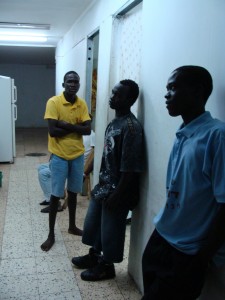 The Huffington Post, February 4, 2010
The Huffington Post, February 4, 2010
Yesterday, the Israeli Knesset debated the “Infiltration Prevention Law” which Israeli human rights groups are calling “one of the most dangerous bills ever presented in the Knesset.”
The bill, if passed, will allow for the immediate deportation of anyone who enters Israel illegally, including African refugees fleeing genocide who may be forced to return to countries where their lives will be endangered. Refugees from Sudan, including those escaping Darfur, will be subject to seven years’ imprisonment as they are citizens of an “enemy country.” And all refugees, children included, will be vulnerable to administrative detention–imprisonment without charges or judicial proceedings.
The bill is intended to update the 1954 Infiltration Prevention Law, which was created to criminalize the actions of Palestinian “fedayeen” (freedom fighters)–Arab refugees who attempted to re-enter Israel in order to reclaim the land they were removed from in 1948, when the state of Israel was established.
Approximately 20,000 African asylum seekers currently call Israel home. 35% of these are from Sudan. Genocide has torn through Darfur, in Western Sudan, since 2003 and South Sudan has been host to a bloody civil war for over 40 years. Another 50% of the refugees come from Eritrea, a country gripped by a brutal dictatorship.
According to Ynet, MK Faina Kirshenbaum of the hard-line Yisrael Beitenu (Israel Our Home) party, which is lead by hawkish Foreign Minister Avigdor Lieberman, called the refugees a burden during yesterday’s discussion.
“I’m certain they will not be welcomed in [the Israeli cities] Raanana or Herzliya,” she added. “I suggest opening an air route to Belgium or Sweden and we’ll see how European countries welcome such an amount of refugees. I suggest they be turned over to other countries.”
Deputy Attorney General Mike Balas pointed out that Israel’s southern border, where African asylum seekers enter the country, is not breached only by refugees, Ynet reported, “One must remember that there are people who are part of smuggling networks and on the border one cannot distinguish between an infiltrator and a refugee.” However, Balas emphasized that the bill is not intended to harm asylum seekers.
But the Israeli government doesn’t recognize many of the refugees as asylum seekers, claiming, instead, that they are migrant laborers who might constitute a security threat.
Oscar, a refugee from the Congo who fled in the midst of war, disputed this claim, according to Ynet: “Most of the refugees I know who live in south Tel Aviv are indeed refugees who escaped danger,” he said, “We didn’t choose to be refugees. There are many children of Holocaust survivors here [in the committee] who were in a similar state as ours, and therefore they should understand us.”
And in a press conference held on Tuesday, human rights groups pointed out that, in 2009, the Israeli government reported that some 90 percent of Eritrean and Sudanese asylum seekers are indeed refugees. “The government is lying to the public and telling the international community the truth,” the NGOs said.
Some observers say that bids to clear refugees from the state are thinly veiled attempts at ethnic cleansing–and this criticism is bolstered by the fact that Prime Minister Netanyahu has publicly called the refugees a threat to the Jewish character of the state.
Critics of the bill also point out that giving sanctuary to such a small number of asylum seekers hardly constitutes a demographic threat. And human rights groups add that in the past year Netanyahu’s government allowed some 120,000 migrant workers into Israel–25 times more than the amount of refugees who trickled in via the southern border during the same period.